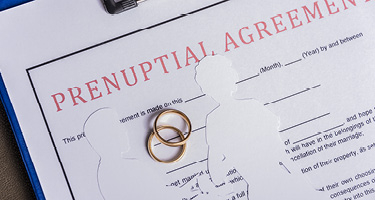New Jersey is an equitable distribution state. This means that any asset acquired by either spouse during the marriage is considered marital property and subject to equitable distribution. As a general rule, assets acquired before the marriage, during the marriage by way of a third-party gift or inheritance are not marital property subject to equitable distribution, i.e., they are immune from equitable distribution. An issue arises when an asset that is immune is “commingled” with a marital asset.
The general assumption is that once an immune asset is commingled with marital property, the immune asset can lose its exempt status and, thus, become marital property subject to equitable distribution. That assumption, however, is not without exceptions. This article will discuss some instances where an asset that is arguably immune from marital distribution gets commingled with a marital asset and how the act of commingling alone does not automatically turn the otherwise immune asset into an asset subject to marital distribution. The act of commingling starts the analysis, but the facts will determine the legal result of whether the commingled asset is subject to equitable distribution. When commingling has occurred, the issue will turn to what has been a dominant factor considered by the courts in addressing commingling: intent.
Commingling of Funds by Placing Immune Money into a Joint Account
When one of the spouses acquires assets that would otherwise be excluded from the marital estate (e.g., pre-marital savings, third-party gifts and inheritances) and places that immune asset into a joint account, the immune asset has now been commingled. Yet commingling alone does not automatically convert what would otherwise be an immune asset to an asset that is distributable. For example, in Wadlow v. Wadlow, 200 N.J. Super. 372, 380 (App. Div. 1985), the Appellate Division held that the trial judge erred when he failed to exclude from the marital estate $20,000 in the form of savings, gifts and inheritances acquired by wife prior to the marriage but commingled over the years because “there was clearly manifested and unequivocal intent that the funds belonged to wife and would ultimately be returned to her or her family.” The Appellate Division found that although the funds were commingled, the assets remained the recipient spouse’s property, absent evidence the parties intended them to become marital property. The key was the intent, a point made abundantly clear.
In another example, Dotsko v. Dotsko, 244 N.J. Super. 668 (App. Div. 1990), the husband received two $10,000 checks from his father and his aunt. The husband deposited those checks into a joint account for approximately 18 days before opening a CD and transferring the funds to the CD. The Appellate Division looked not only at the intent of the husband’s father and aunt in gifting the monies to the husband but pointedly at the husband’s intent when he placed the two checks into the joint account. It held that:
“the evidence of monies deposited into a joint account for approximately 18 days was insufficient to overcome the contrary evidence. Gifts made exclusively to [the husband] not only reflected the donors’ intent but his as well. He did not intend to make an interspousal gift by merging cash and checks in the joint account over the holidays while waiting for a new gift in the new year. We find that the exempt gifts did not become subject to equitable distribution.”
In Dotsko, the Appellate Division made it clear that placing an asset in joint names does not automatically turn an immune asset into marital property subject to equitable distribution. The focus was the intent. When one spouse temporarily places an otherwise immune asset into a joint account with no evidence of intent of making an interspousal gift, only to move that asset into an individual account shortly after, it is likely the asset will remain protected from equitable distribution.
Commingling of Funds Resulting from the Distribution of Personal Injury Awards
Our courts have been clear that monies realized as a result of a settlement or judgment as compensation for pain, suffering, disfigurement, disability or other debilitation of the mind or body for a personal injury that occurred during marriage is property of the injured spouse not distributable under N.J.S.A. 2A:34–23. The only damages truly shared are those for the diminution of the marital estate by loss of past wages or expenditure of money for medical expenses.
An issue arises when proceeds paid for personal injuries and loss of consortium of one spouse are received, commingled and disbursed, whether they remain immune from equitable distribution. In Ryan v. Ryan, 283 N.J. Super. 21, 22 (Ch. Div. 1993), the wife received a settlement as a result of an automobile accident. The settlement was payable to the wife for pain and suffering and to the husband for his loss of consortium, without an apportionment fixed between the two claims. The original settlement was turned over exclusively to the wife for deposit in her name alone without any reservation. The funds were then withdrawn to purchase a residential property in joint names again without any reservation. Again, the focus was the intent. The court held that the lack of reservation confirmed the intent that the funds were the exclusive property of both parties. Additionally, the deposit of the balance of the funds into a joint savings account, commingled with their other funds, further indicated “the commingling of separate funds for pain and suffering and loss of consortium with marital property converted those funds into marital property.”
Conclusion
Thus, assets exempt from equitable distribution may become subject to equitable distribution if the recipient intends them to become marital assets. In Wadlow, there was a clearly manifested and unequivocal intent that the $20,000 acquired by the wife prior to the marriage would ultimately be returned to her. In Dotsko, it was clear that a gift received by the husband was deposited into a joint account for approximately 18 days and then withdrawn and deposited into an individual account for the husband with the clear intention that the gift was only to the husband. In Ryan, the lack of reservation indicated the intent that the funds were the exclusive property of both parties.
The act of commingling alone does not automatically turn the otherwise immune asset into an asset subject to marital distribution; however, from the moment the act of commingling occurs, there will be a dispute as to its distribution. The issue turns to intent. Accordingly, a spouse with an otherwise exempt asset must be cautious as to where the asset is deposited, how it is used and who is going to have access to it.

Tamires M. Oliveira is a member of the Family Law Department at Greenbaum, Rowe, Smith & Davis LLP. Her work on behalf of the firm’s clients encompasses matters related to divorce and separation proceedings, child custody and support, alimony, marital settlement agreements, domestic partnerships, prenuptial and postnuptial agreements, domestic violence cases, the valuation and distribution of marital assets and post-judgment enforcement and modification applications. Admitted to practice in New Jersey and New York, she earned her J.D. from Seton Hall University School of Law and received her B.A. from Montclair State University.
































